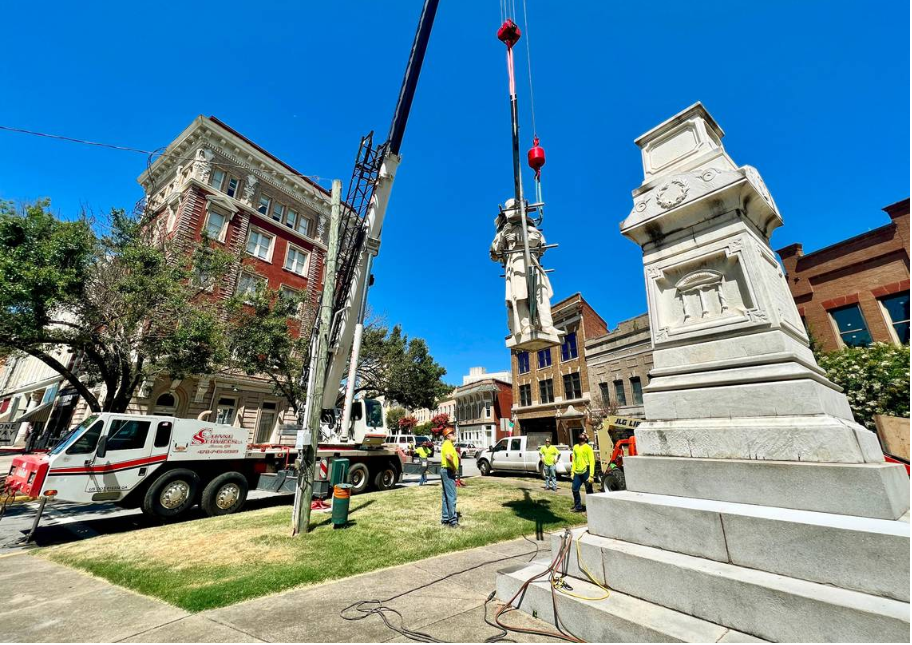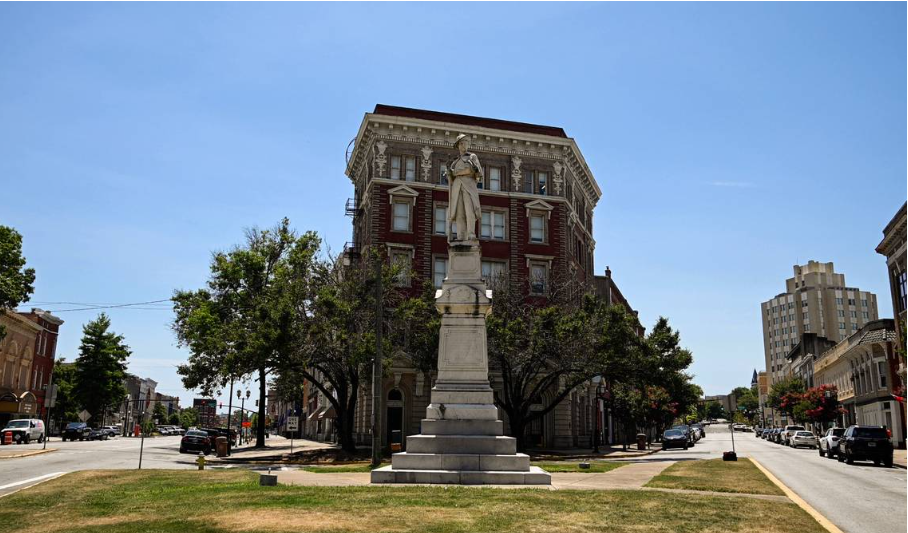
Caption
Crews lower the Confederate monument on Cotton Avenue while removing it Wednesday morning. The monument will be relocated to Whittle Park in front of Rose Hill Cemetery.
Credit: Jason Vorhees/The Telegraph
|Updated: January 28, 2025 2:34 PM

Crews lower the Confederate monument on Cotton Avenue while removing it Wednesday morning. The monument will be relocated to Whittle Park in front of Rose Hill Cemetery.
After years of legal wrangling, crews began moving two Confederate monuments from their downtown locations to a park along Riverside Drive Wednesday morning.
Private money raised by the Community Foundation of Central Georgia will fund the removal of the two monuments, located on Cotton Avenue and Poplar Street, starting Wednesday morning. Crews managed by Macon’s Urban Development Authority will move the monuments to Whittle Park, a green space outside of Rose Hill Cemetery on Riverside Drive.
Their removal is the culmination of years of efforts by Bibb County residents that were renewed during the summer of 2020. The Macon-Bibb County Commission approved moving the monuments in July of 2020, but a lawsuit stalled the efforts.
The Cotton Avenue statue, which represents an anonymous Confederate soldier, was defaced that same month, but Macon artists supportive of the Black Lives Matter movement constructed a mural to protect it.
Once removed, the area at Cotton Avenue and Second Street will become an area for the community to gather, according to UDA executive director Alex Morrison.
“A lot of vital businesses and residential areas are right here and we want to expand this green space, which is a place that we think can be a signature location for people to gather and communicate with each other right here on Cotton Avenue,”
Morrison said. “[Our goal is] to create a better space from an urban design perspective that really speaks to the intimate residential area this has become.” Morrison said Whittle Park is the statues’ final home.
“Our intent is that this will be the one and only time that it will move,” he said.

The Confederate monument located at Second St. and Cotton Ave. will be moved to Whittle Park out front of Rose Hill Cemetery Wednesday morning.
The history of the monuments runs all the way back to the 1800s. The soldier statue on Cotton Avenue was built in the late 1870s and originally stood on Mulberry Street before it was moved to its location on Cotton Avenue in the 1950s.
Civil War documents, including a letter by Confederate president Jefferson Davis, were found inside a box at the bottom of the statue at one point and were eventually removed and copied.
Another time capsule was found Wednesday after the statue was moved.
The monument on Poplar Street was built by the Daughters of the Confederacy and labeled with the dates 1861-65, though the exact construction date isn’t known. The statue was dedicated to “women of the South,” according to city documents.
These statues stood in Macon for decades, but became the subjects of debate in recent years.
Controversy surrounding the monuments, particularly the Cotton Avenue statue, reached a peak in the summer of 2020 during Black Lives Matter protests following the killings of Ahmaud Arbery, Breonna Taylor and George Floyd.
“We’re not asking to put it in a dungeon. We’re not asking that it be thrown in the Ocmulgee River. We’re not asking that it be desecrated,” former Macon mayor C. Jack Ellis said during protests in 2020. “We ask that it be put in its proper place, and that’s Rose Hill Cemetery, where those soldiers are buried and where this belongs because it, too, is dead. This era is dead, dead and gone. Put it in the cemetery where it belongs.”
Rose Hill Cemetery seemed an ideal place for the monuments due to the 884 Confederate soldiers buried there. Murals labeled with the slogan #BlockTheHate were installed at the base of the statue to both protest and protect it. Protests against the statues continued throughout the summer.
The protests prompted the Macon-Bibb County Commission in July 2020 to approve by a slim 5-4 margin moving the monuments to Whittle Park outside Rose Hill Cemetery. Commissioner Virgil Watkins sponsored the original resolution that year, which eventually grew into the proposal that was approved on July 21.
The removal of the monuments quickly hit a roadblock later, however, after a lawsuit was filed protesting relocation.
Maconite Martin Bell filed the suit against Bibb County and a judge granted Bell a temporary injunction in August of 2020.
“I thought this is exactly the way it would go, the law is very specific on what it requires,” Bell told the Telegraph at the time. “All responses have been very, very positive, haven’t heard any negative responses.”
Bell, along with lawyer Walker Chandler, cited a Georgia law that restricts where local governments can relocate Confederate statues. The law states that a Confederate monument must be relocated to a place of “equal prominence.”
Over the following months, complaints filed by Bell in federal court prevented the relocation The case was remanded back to Bibb County in November after Bell dropped the federal complaints.
A hearing was scheduled between Bell and the county in February of 2021, but a motion to dismiss the case was granted to Macon-Bibb County last March.
Almost two years after the county voted to relocate the monuments, they’re finally on the move. Some Maconites are happy to see them go.
“I’m glad to see it happen, it’s going to be nice,” said Trey Wood, an architect whose office building sits across the street from the Cotton Avenue statue. “The idea of it moving over to Rose Hill Cemetery, that makes perfect sense to me. I’m in favor of it.”
Ellis, who has long hoped that the monuments would be moved from their downtown locations, told The Telegraph by phone from Uganda on Tuesday that he was glad to hear of the statues’ relocation.
“I rejoice. ...This is the right thing to do,” the former Macon mayor said. “The time has come.”
Ellis also said the new location is more appropriate, near “a place of reverence” in Rose Hill Cemetery.
The Sons and Daughters of the Confederacy also approved of the move, according to Morrison and the UDA. The groups came to a compromise with the county in terms of location.
The site just outside Rose Hill Cemetery is made up of two concrete base platforms on a hill approaching Riverside Drive. The statues will reside near the side of the cemetery that slopes towards the Ocmulgee River and houses the Confederate soldiers’ graves, along with a Civil War marker.
Telegraph archives and work by Telegraph reporter Joe Kovac Jr. were used in this story.
This story comes to GPB through a reporting partnership with The Telegraph.